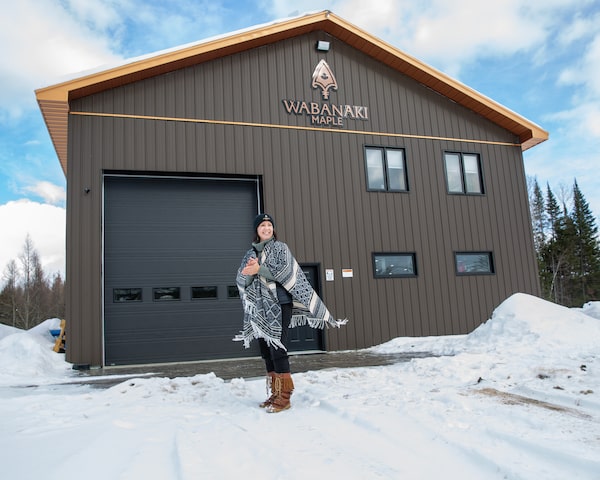
Jolene Johnson created Wabanaki Maple to unite her ties to her ancestral roots with her love for culture and food. She hopes to one day expand her manufacturing company into a hands-on sugar farm where she can teach people about the Indigenous heritage behind maple syrup.Courtesy Jolene Johnson
Like many recovering from heartbreak, on the heels of a difficult relationship Jolene Johnson went home. Not to the cities where she spent the first 28 years of her life – across southern Ontario, Halifax, N.S. or Saint John, N.B. – but to her father’s community, Tobique First Nation. Home to roughly 2,500 people in northwestern New Brunswick, she joined her parents there, who had recently retired to the community, and took up work on her sister’s small sugar farm nearby.
Throughout the 1990s and 2000s, Johnson worked on a sugar farm every spring, collecting sap trickling down from more than 500 trees. During the off-season, she picked up shifts at a restaurant and catering business.
It was work that reflected her love of all things culinary. Whether she was cooking at home for her five siblings when her parents were out, or in restaurants later in life, Johnson loved seeing the smiles on people’s faces when they tasted something new.
Now, among her family and in closer proximity to her cultural roots than she’d ever been, Johnson suddenly found herself on a journey to explore her heritage – and a promising entrepreneurial enterprise that rekindled her love of food.
In many ways, the hobby farm mirrored the traditional practices of Indigenous communities from years past. Johnson’s sister collected maple tree sap not for commercial purposes, but for the benefit of family members, friends and neighbours, reflecting the centuries-old tradition of harvesting for personal use. “It was not built around industry,” Johnson says.
Wabanaki Maple outsources raw maple syrup and fills it in a bourbon or oak barrel to create a sweet and woody flavour profile.Sadie Dunnett
Maple syrup, now a globally recognized Canadian export, saw a staggering 70 million kilograms shipped to 72 countries in 2022, generating $616 million in sales, as per a report from Agriculture and Agri-Food Canada.
For Indigenous nations, including the Haudenosaunee and Ojibwe, maple syrup has been a staple for millennia. It was harvested during the sugar moon, a full moon event that typically marks the end of winter and beginning of spring, marking a time to host celebrations and express gratitude to the maple trees for producing sap. Traditionally, maple syrup served various purposes beyond culinary, including as a meat preservative, anesthetic and medicinal sweetener.
Despite its deep-rooted Indigenous origins, the modern maple syrup industry often overlooks its Indigenous heritage.
“There was minimal representation in the maple syrup industry of Indigenous culture,” Johnson says. Motivated by her growing connection to her ancestral background, she founded a company that merged her passions.
Johnson started Wabanaki Maple in 2018, a manufacturer that distributes barrel-aged maple syrup to more than 200 retailers across the country. “Through the company, I wanted to share a piece of our Indigenous culture,” Johnson says.
Wabanaki Maple outsources raw maple syrup and fills it in a bourbon or oak barrel. The syrup sits in the barrels for a minimum of three months, and the flavours exuded by the wood and spirits result in a golden buttery or sweet maple taste.
Johnson also infuses other ingredients, such as elderberry and chipotle, in some batches to create diverse flavour profiles. “[Maple syrup] is such a versatile product,” Johnson says. “I recognized that you could do so many things with infusions and barrel-aged flavours.”
There are other Indigenous-owned maple syrup companies in Canada. But Johnson says there wasn’t the same movement occurring in her neck of the woods.
Wabanaki Maple is credited as the first Indigenous and female-owned maple syrup business in Atlantic Canada. Johnson says that she hopes Wabanaki Maple can inspire other Indigenous entrepreneurs to launch their own maple syrup company as demand for the product rises.
“I feel as though what I’ve done may open those doors for other Indigenous communities,” she says.
Down the road, Wabanaki Maple is looking to produce its own maple syrup. It would be part of a larger mission to add an educational component to the business. Although no concrete plans are in place yet, Johnson is actively eyeing plots of land to build her own sugar farm.
Her long-term goal is to have a farm where tourists can visit, cook their own dish and see the origins of maple syrup through visual displays, like a birch bark basket hanging on a maple tree, compared to the tubing methods that are often used today.
“I envision taking them back in time,” Johnson says, “to how our people would have harvested maple syrup.”
One in a regular series of stories. To read more, visit our Indigenous Enterprises section. If you have suggestions for future stories, reach out to IE@globeandmail.com